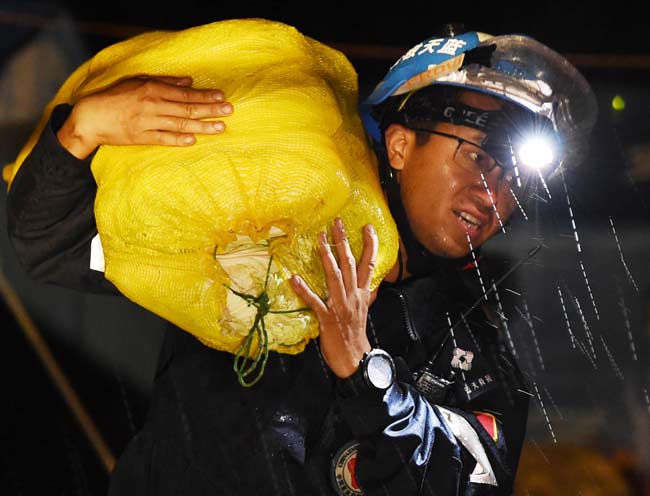Experts call for improved management of volunteer groups

A volunteer with the Blue Sky rescue team delivers supplies to the quake zone on Aug 7, four days after the magnitude-6.5 earthquake hit Ludian county of Yunnan province. RAN WEN / FOR CHINA DAILY
China must strengthen the management of volunteer rescue teams to ensure their orderly development and regulate their participation in disaster relief operations, insiders have said.
While volunteer outfits have provided essential assistance in emergency situations in recent years, a lack of coordination and poor communications have occasionally hampered emergency efforts.
For example, in August 2014, when a magnitude 6.5 earthquake hit Ludian county, Yunnan province, Li Feng, head of the Green Boat Emergency Rescue, assessed the level of damage with senior colleagues and then dispatched a 15-strong team to the affected area.
However, when the team members arrived in Ludian, they found the county square was packed with volunteers, many of whom were unsure of the role they were expected to play.
"There were more rescuers than victims," Li recalled.
Having liaised with the local government, Li's team knew exactly where it was needed, but many volunteers remained in the square.
Eventually, Li's team commandeered a group of volunteers who joined the members in an isolated village in Qiaojia county, providing emergency relief for several days.
According to Li, similar scenarios are not unusual, given the rapid rise in the number of volunteer relief organizations since the 2008 Wenchuan earthquake in Sichuan province - the recently established Ministry of Emergency Management puts the number at nearly 11,000 civilian rescue teams with about 694,000 members.
She recalled how volunteers' vehicles jammed roads vital to the transportation of survivors and medical supplies in Ludian, even though a temporary headquarters had been established for civilian teams.
More recently, the government had to call on volunteers to stop pouring into the area around Jiuzhaigou following a magnitude 7 quake in the mountainous area of Sichuan in August.
However, there is no doubt that volunteer teams can complement the work of official rescue teams. In Ludian, for example, Li's team worked with a group of soldiers, using rope skills to access damaged buildings so they could be demolished, thus helping to alleviate the danger posed by the unsafe structures.
While Li is concerned that resources will be wasted if the government fails to oversee the activities of volunteer rescue teams, the China Social Welfare Foundation has called for industry-style regulations to ensure that teams become more professional, with certain outfits specializing in specific aspects of relief work.
The foundation has participated in disaster alleviation since the Wenchuan quake. Its official team, registered in 2103, can mobilize 300 to 500 volunteers, and has participated in 12 major rescues at home and overseas, including the 2015 Nepal earthquake.
In a statement to China Daily, the foundation said all volunteer teams should be officially registered and should only participate in emergency relief efforts under government guidance.
"They will only provide the government with effective assistance when they are able to carry out orderly operations that do not add to the existing problem," it stated.
Editor: Wang Shixue